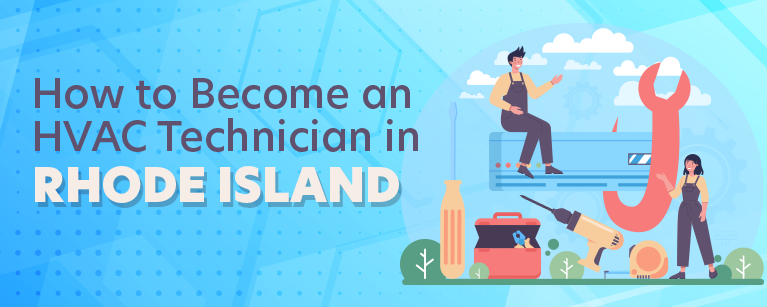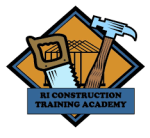
HVAC technicians are some of the true unsung heroes of the Rhode Island community.
They help families and businesses through some of their most vulnerable moments – making it one of the most desirable and rewarding careers in the world right now.
If you’re interested in getting your feet wet and pursuing a career in the HVAC industry, then you’re about to embark on an adventure worth telling your grandkids.
Table of Contents
How to Become an HVAC Technician in Rhode Island: A Step-by-Step Guide
Becoming an HVAC technician won’t happen overnight, but you’ll be well on your way after the first two years and it’ll set you up for a lifetime of success.
There will be some schooling (or an apprenticeship) involved, you’ll have to obtain an EPA certification, and you’ll need to be licensed through the state, but the hard work pays off for those who stay committed.
Here’s a closer look at what you’ll be asked to do.
Complete Your Education/Apprenticeship
Anyone interested in becoming an HVAC technician in Rhode Island will need a high school diploma or GED.
Beyond that, aspiring HVAC technicians are asked to complete a certain number of hours of hands-on training and classroom learning to ensure they’re seasoned before truly entering the industry.
These hours can be achieved through a college-level program at a school recognized by the Rhode Island Department of Labor and Training or through an accredited apprenticeship program.
After 4-5 years in an accredited program, the individual can upgrade the license from apprentice to journeyperson.
Obtain EPA Certification
According to Section 608 of the Clean Air Act, all aspiring HVAC technicians are required by federal law to obtain an EPA certification – this is true for anyone who handles, works with, or tests equipment that releases ozone-depleting refrigerants into the atmosphere.
There are four types of EPA certifications:
- Type I – certifies an individual to install, repair, maintain, test, and handle small appliances that contain less than five pounds of refrigerant.
- Type II – certifies an individual to install, repair, maintain, test, and handle high-pressure units that contain more than five pounds of refrigerant (most standard commercial and residential systems).
- Type III – certifies an individual to install, repair, maintain, test, and handle low-pressure units (such as centrifugal chillers).
- Universal – certifies an individual to install, repair, maintain, test, and handle small appliances, high-pressure units, and low-pressure units that contain any amount of refrigerant.
Aspiring HVAC technicians will need to pass an exam before obtaining their EPA certification – no matter what type of certification they’re interested in.
The exam will cover everything from refrigeration to Section 608 regulations, the Clean Air Act and the Montreal Protocol, ozone depletion, safety, and much more.
Obtain HVAC License
The Rhode Island Department of Labor and Training, Division of Professional Regulation offers three types of contractor’s licenses for HVAC technicians – sheet metal technician, refrigeration/air conditioning technician, and pipefitter.
Here’s what you’ll need before graduating from apprentice to journeyperson:
- Sheet Metal Technician – complete a four-year apprenticeship program and pass the exam.
- Refrigeration/Air Conditioning Technician – complete 10,000 hours (5 years) and 144 classroom hours per year in an apprenticeship program and pass the exam.
- Pipefitter – complete 10,000 hours (5 years) and 144 classroom hours per year in an apprenticeship program and pass the exam.
Here’s what you’ll need before graduating from journeyperson to master contractor:
- Sheet Metal Technician – hold journeyperson status for one year and pass contractor exam ($240 fee).
- Refrigeration/Air Conditioning Technician – hold journeyperson status for one year and pass contractor exam ($240 fee).
- Pipefitter – hold journeyperson status for one year and pass contractor exam ($240 fee).
Contractors who are performing basic HVAC work won’t need to be licensed by the state, but they will need to be registered with the State of Rhode Island Contractors’ Registration and Licensing Board (RICRLB) – which requires 5 hours of classes, a certificate of liability and insurance, and a one-time fee.
Obtain Secondary Certifications
For those who want to take their career a step further, the North American Technical Excellence (NATE) certification and the ASHRAE (American Society of Heating, Refrigeration, and Air-Conditioning Engineers) certification would complement the certifications you already gained as an HVAC contractor.
HVAC Schools in Rhode Island
If you’re interested in becoming an HVAC technician or contractor, enrolling in an HVAC program at a state-accredited school is often the best way to get started – ensuring all aspiring technicians are given the tools they need to succeed in this industry.
Luckily for Rhode Island residents, they have options!
1. New England Institute of Technology
Location: 240 Smith St, Lowell, MA 01851
Program: New England Institute of HVAC
Located about an hour and a half from Rhode Island, the New England Institute of HVAC offers a day course for $6,975 and a night course for $5,975.
It’s a 13-week curriculum that covers basic electricity, oil heat, gas heat, and other topics.
The course is owned by David Rousseau and Jack Burkhardt.
2. New England Tractor Trailor Training School
Location: 1600 Osgood St #3107, North Andover, MA 01845
Program: HVACR Technology
Located just 40 minutes north of Boston, the New England Tractor Trailor Training School offers HVACR training that can give you hours toward your license (refrigeration, pipefitter, natural gas, propane, oil burner).
Your instructor will be an experienced HVAC technician, ensuring you learn from the best.
3. The Rhode Island Construction Training Academy
Location: 249 Roosevelt Ave, Pawtucket, RI 02860
Program: Apprenticeship
Located just 10 minutes northeast of Providence, RI, the Rhode Island Construction Training Academy offers apprenticeship programs for HVAC/refrigeration, pipefitting, and sheet metal technicians.
You’ll earn the required amount of classroom hours and will be eligible to take your license exam upon completion.
4. MotoRing Technical Training Institute (MTTI)
Location: 1241 Fall River Ave, Seekonk, MA 02771
Program: HVAC/R Technician Training
Located just 12 minutes southeast of Providence, RI, the MotoRing Technical Training Institute (MTTI) – which sits along the Rhode Island-Massachusetts border – offers a 30-week day and 75-week evening course that will prepare you for entry-level positions in the industry.
You’ll gain 288 education hours.
5. Other Apprenticeship Programs in Rhode Island
Aspiring HVAC technicians can find other apprenticeship programs through the Rhode Island Department of Labor and Training and the Rhode Island Builders Association (RIBA).
Before you sign up for anything, make sure you’re enrolling in a state-accredited program that will give you hours toward your license.
The Air Conditioning Contractors of America (ACCA), Mechanical Contractors Association of America (MCAA), Plumbing-Heating-Cooling Contractors Association (PHCCA), and Sheet Metal Workers International Association (SMWIA) also offer apprenticeship programs for aspiring HVAC technicians.
| School Name | Address |
|---|---|
| New England Institute of Technology | 240 Smith St, Lowell, MA 01851 |
| New England Tractor Trailor Training School | 1600 Osgood St #3107, North Andover, MA 01845 |
| The Rhode Island Construction Training Academy | 249 Roosevelt Ave, Pawtucket, RI 02860 |
| MotoRing Technical Training Institute (MTTI) | 1241 Fall River Ave, Seekonk, MA 02771 |
HVAC Technician Salary in Rhode Island
The average salary for an HVAC technician in the United States is $49,178 (between $42,491 and $57,942) – the average salary increases to $51,538 (between $44,530 and $60,723_ in the state of Rhode Island.
Of course, your salary will depend on a wide range of factors – including your education, certifications, experience, other skills, and the company you’re working for.
Annual Salary Range:| Location | Avg. Annual Salary |
|---|---|
| Providence | $51,629 |
| Warwick | $51,629 |
| Cranston | $51,629 |
| Pawtucket | $51,629 |
| East Providence | $51,629 |
| Woonsocket | $51,580 |
| Newport | $51,913 |
| Central Falls | $51,629 |
| North Providence | $51,629 |
| Westerly | $52,170 |
Regional Salary in Rhode Island
| Region | Employed | Avg. Annual Salary | Avg. Hourly Pay | Top 10% Annual Salary | Bottom 10% Annual Salary |
|---|---|---|---|---|---|
| Providence-Warwick, RI-MA | 1,360 | $62,660 | $30.12 | $78,190 | $46,380 |
* Employment conditions in your area may vary.
Frequently Asked Questions
How often do I need to renew my HVAC license in Rhode Island?
Yes, you must renew it before it expires every two years (one year for contractors).
Can I use my Rhode Island HVAC license in any other US state?
No, your Rhode Island HVAC license is only valid in the state of Rhode Island.
How long does it take to get an HVAC license in Rhode Island?
It’ll take most people four years to make their way from an apprentice HVAC technician to a journeyperson HVAC technician.
HVAC Technician Info by State
- Alabama
- Alaska
- Arizona
- Arkansas
- California
- Colorado
- Connecticut
- Delaware
- Florida
- Georgia
- Hawaii
- Idaho
- Illinois
- Indiana
- Iowa
- Kansas
- Kentucky
- Louisiana
- Maine
- Maryland
- Massachusetts
- Michigan
- Minnesota
- Mississippi
- Missouri
- Montana
- Nebraska
- Nevada
- New Hampshire
- New Jersey
- New Mexico
- New York
- North Carolina
- North Dakota
- Ohio
- Oklahoma
- Oregon
- Pennsylvania
- Rhode Island
- South Carolina
- South Dakota
- Tennessee
- Texas
- Utah
- Vermont
- Virginia
- Washington
- West Virginia
- Wisconsin
- Wyoming









